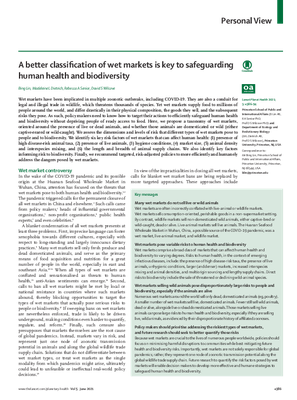A Better Classification of Wet Markets is Key to Safeguarding Human Health and Biodiversity
Wet markets have been implicated in multiple zoonotic outbreaks, including COVID-19. They are also a conduit for legal and illegal trade in wildlife, which threatens thousands of species. Yet wet markets supply food to millions of people around the world, and differ drastically in their physical composition, the goods they sell, and the subsequent risks they pose. As such, policy makers need to know how to target their actions to efficiently safeguard human health and biodiversity without depriving people of ready access to food.
https://biodiversitylinks.org/learning-evidence/one-health-evidence/one-health-evidence-inbox/a-better-classification-of-wet-markets-is-key-to-safeguarding-human-health-and-biodiversity.pdf/view
https://biodiversitylinks.org/learning-evidence/one-health-evidence/one-health-evidence-inbox/a-better-classification-of-wet-markets-is-key-to-safeguarding-human-health-and-biodiversity.pdf/@@download/image/image.png
File
A Better Classification of Wet Markets is Key to Safeguarding Human Health and Biodiversity
Author(s):
Bing Lin
,
Madeleine L Dietrich
,
Rebecca A Senior
,
David S Wilcove
Publication Date: 2021
DOWNLOAD FILE
Wet markets have been implicated in multiple zoonotic outbreaks, including COVID-19. They are also a conduit for legal and illegal trade in wildlife, which threatens thousands of species. Yet wet markets supply food to millions of people around the world, and differ drastically in their physical composition, the goods they sell, and the subsequent risks they pose. As such, policy makers need to know how to target their actions to efficiently safeguard human health and biodiversity without depriving people of ready access to food.



